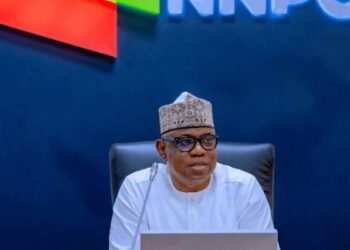Nigeria has paid over N2.802 trillion as petrol under-recovery sums between February 2021 when the payment of petrol subsidy fully resumed and June 2022, a period of 17 months.
However, while the monies paid for fuel subsidy in the whole of 2021 was N1.43 trillion, between January and June of 2022, the country has almost equalled that amount, with subsidy hitting N1.372 trillion in the first six months of this year.
According to official figures from the Nigerian National Petroleum Company (NNPCL), what that implies is that the amount paid for fuel subsidy in the entire 12 months of 2021, has equalled the one paid in the first six months of 2022.
The development underscores the negative impact of the international price of crude oil, which averaged $80 in 2021 but has hit as high as $120 sometime this year on the country’s importation costs.
President Muhammadu Buhari recently backtracked on the planned full deregulation of the downstream sector, including the wholesale removal of petrol subsidy, citing the negative impact it would have on the poor and the vulnerable in the country.
For decades, Nigeria’s attempt to fully free the downstream oil and gas industry has met with a brick wall even as the latest effort had been pushed forward by about 18 months, culminating in around June next year and effectively exempting the current administration which will exit by May 2023 of the burden.
In addition, the NNPCL has been struggling with production capacity, pumping less than 1.1 million barrels of crude oil daily last month as against its projected 1.8 million barrels per day, on the back of dilapidating upstream infrastructure and years of under-investment.
A breakdown of the various subsidy deductions indicated that payments had increased progressively since 2021, growing from N24.3 billion in February to N60.3 billion in March and N61.9 billion in April.
Furthermore, in May, the NNPC removed N126 billion as subsidy, while June came next with N164.3 billion. In July, the document stated that N103.2 billion was spent on what the government terms under-recovery.
Hitherto, August had the year’s lion’s share of N173.1 billion but was overtaken by the deduction in November of N200 billion, while September’s deduction stood at N149.28 billion and the October figure was N163.709 billion, before the N270 billion removed in January.
The NNPCL had told the nation that Nigeria was losing about 42 million litres of petrol to the activities of smugglers across the country’s borders, increasing Nigeria’s estimated daily consumption of 60 million litres to 103 million litres at a point, thereby worsening the subsidy payment regime.
Nigeria has not been able to reap the full benefits of rising international oil prices because it doesn’t refine a drop of the fuel it consumes locally.
This means that almost all the revenues from sales are spent importing petrol and paying subsidies, even for neighbouring countries where the product is smuggled into.
On November 23, 2021, the Group Managing Director of NNPC , Mallam Mele Kyari, had projected that petrol would sell for between N320 and N340 per litre from February, this year if the federal government began full deregulation of the downstream as prescribed by the Petroleum Industry Act (PIA). But the estimated price of petrol as of June this year was put at between N500 and N550 if subsidy is yanked off.
But a further review of the first half of 2022 data released by the NNPCL showed that petrol subsidy claims surpassed oil and gas revenue by a whopping N210 billion during the period.
In addition, within the period under review, the NNPCL recorded N2.39 trillion as gross revenue from oil and gas receipts, while subsidy claims amounted to N2.6 trillion.
The data further revealed that N1.59 trillion was used to cover part of the subsidy costs in the first six months, leaving an outstanding balance of N1.01 trillion to be recovered from July 2022 proceeds this month.
Nigeria is currently facing an economic crisis with rising debt servicing costs, fuel subsidy payments, which from all indications could exceed the budgeted N4 trillion this year as well as a massive drawdown on its Excess Crude Account (ECA).
In January, February and March 2022, the data indicated that petrol subsidy payments gulped N210.38 billion, N219.78 billion, and N245.77 billion, respectively while in April, Nigeria spent N271 billion and N327.07 billion in May 2022 to cater for the shortfall of the importation of petrol.
For the month of June, the national oil company deducted N319.18 billion from the federation account as payment for petrol subsidy.
To compound the current subsidy crisis, Nigeria does not know its exact daily consumption of petrol and is believed to be subsidising neighbouring countries due to the arbitrage created by the subsidy in Nigeria.
The problem is expected to even worsen in 2023 with a current projection of as much as N6.72 trillion by the country in its 2023-2035 Medium-term Expenditure Framework & Fiscal Strategy Paper (MTEF&FSP).
Buhari recently responded to international criticism of the retention of subsidy payment, especially by the World Bank and the International Monetary Fund (IMF), stressing that even in the West, subsidies are being paid by governments in various forms.






























































